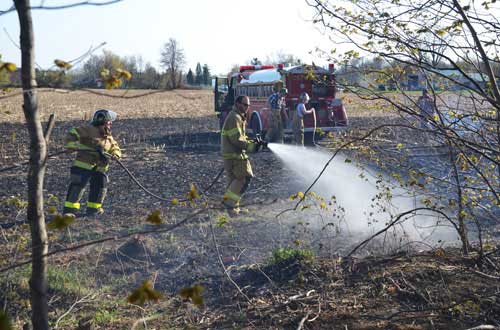DEC has residential burn ban in effect until May 14

File photo by Tom Rivers: Richard Barnard, right, and Amanda Dixon work to put out a brush fire on May 3, 2015 on Route 98 in Barre.
Press Release, DEC
Department of Environmental Conservation Commissioner Basil Seggos reminds residents that with spring here and conditions for wildfires heightened, residential brush burning is prohibited through May 14 across New York State.
“While many people associate wildfires with the western United States, the start of spring weather and the potential for dry conditions increases the risk for wildfires in New York,” DEC Commissioner Seggos said. “New York prohibits residential burning during the high-risk fire season to reduce wildfires and protect people, property, and natural resources. The ban has been extremely effective in reducing the number of wildfires, and we’re encouraging New Yorkers to put safety first.”
Warming temperatures in the spring can quickly cause wildfire conditions to arise. Open burning of debris is the largest single cause of spring wildfires in New York State. When temperatures are warmer and the past fall’s debris and leaves dry out, wildfires can start and spread easily and be further fueled by winds and a lack of green vegetation.
New York first enacted strict restrictions on open burning in 2009 to help prevent wildfires and reduce air pollution. The regulations allow residential brush fires in towns with fewer than 20,000 residents during most of the year, but prohibit such burning in spring when most wildfires occur.
In the eight-year period since the ban was established, the average number of spring fires per year decreased by 36.7 percent, from 2,649 in 2009, to 1,677 in 2016.
Campfires using charcoal or untreated wood are allowed, but people should never leave such fires unattended and must extinguish them. Burning garbage or leaves is prohibited year-round.
Some towns, primarily in and around the Adirondack and Catskill parks, are designated “fire towns.”
Violators of the state’s open burning regulation are subject to both criminal and civil enforcement actions, with a minimum fine of $500 for a first offense. To report environmental law violations call 1-800-TIPP DEC (1-800-847-7332), or report online by clicking here.




































































